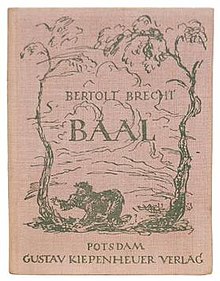
Drums in the Night is a play by the German playwright Bertolt Brecht. Brecht wrote it between 1919 and 1920, and it received its first theatrical production in 1922. It is in the Expressionist style of Ernst Toller and Georg Kaiser. The play—along with Baal and In the Jungle—won the Kleist Prize for 1922 ; the play was performed all over Germany as a result. Brecht later claimed that he had only written it as a source of income.
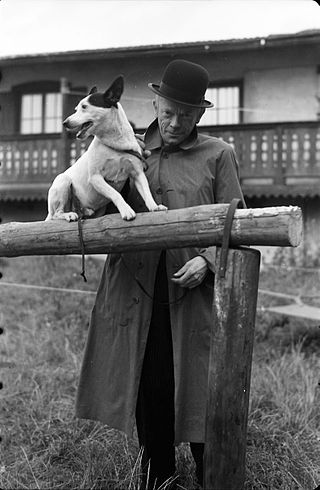
Karl Valentin was a Bavarian comedian. He had significant influence on German Weimar culture. Valentin starred in many silent films in the 1920s, and was sometimes called the "Charlie Chaplin of Germany". His work has an essential influence on artists like Bertolt Brecht, Samuel Beckett, Loriot and Helge Schneider.
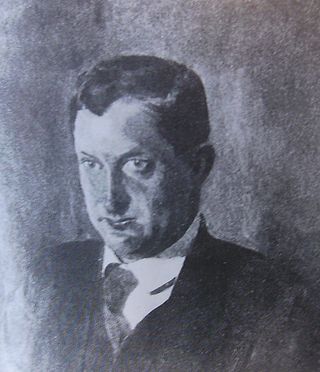
Arthur Kutscher was a German historian of literature and researcher in drama. Together with Max Herrmann he can be seen as a founding father of theatre studies in Germany. He was a professor at Munich University, where he taught a famous seminar in theatre history. Kutscher was a friend of the iconoclastic dramatist and cabaret-star Frank Wedekind. His work influenced many playwrights, poets, and directors. His students included Bertolt Brecht, Erwin Piscator, Peter Hacks, Hanns Johst, Klabund, and Erich Mühsam. Brecht's first full-length play, Baal, was written in response to an argument in one of Kutscher's drama seminars. While Kutscher was responsible for inspiring an admiration for Wedekind in the young Brecht, he was "bitterly critical" of Brecht's own early dramatic writings.
Refunctioning is a core strategy of the aesthetic developed by the German modernist theatre practitioner Bertolt Brecht.
The technique of interruption pervades all levels of the stage work of the German modernist theatre practitioner Bertolt Brecht—the dramatic, theatrical and performative. At its most elemental, it is a formal treatment of material that imposes a "freeze", a "framing", or a change of direction of some kind; something that is in progress is halted in some way.
Mr Puntila and His Man Matti is an epic comedy by the German modernist playwright Bertolt Brecht. It was written in 1940 and first performed in 1948.
The Decision, frequently translated as The Measures Taken, is a Lehrstück and agitprop cantata by the twentieth-century German dramatist Bertolt Brecht. Created in collaboration with composer Hanns Eisler and director Slatan Dudow, it consists of eight sections in prose and unrhymed, free verse, with six major songs. A note to the text by all three collaborators describes it as an "attempt to use a didactic piece to make familiar an attitude of positive intervention."
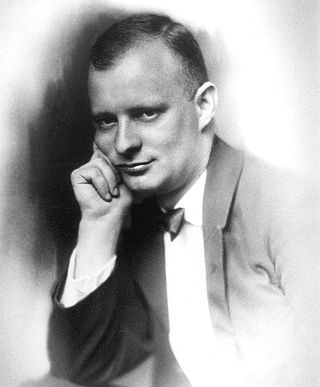
The Baden-Baden Lesson on Consent is a Lehrstück by the German dramatist Bertolt Brecht, written in collaboration with Slatan Dudow and Elisabeth Hauptmann. Under the title Lehrstück it was first performed, with music by Paul Hindemith, as part of the Baden-Baden festival on 28 July 1929, at the Stadthalle, Baden-Baden, directed by Brecht, designed by Heinz Porep.
In the Jungle of Cities is a play by the German modernist playwright Bertolt Brecht. Written between 1921 and 1924, it received its first theatrical production under the title Im Dickicht at the Residenztheater in Munich, opening on 9 May 1923. This production was directed by Erich Engel, with set design by Caspar Neher. The cast included Otto Wernicke as Shlink the lumber dealer, Erwin Faber as George Garga, and Maria Koppenhöfer as his sister Mary. Im Dickicht was produced at Max Reinhardt's Deutsches Theater in Berlin, where Brecht had been employed as a dramaturg. The production opened on 29 October 1924, with the same director and scenographer, but in a cut version with a new prologue and the title Dickicht: Untergang einer Familie. Fritz Kortner played Shlink and Walter Frank played George, with Franziska Kinz, Paul Bildt, Mathias Wieman, and Gerda Müller also in the cast. Willett and Manheim report that this production "was not a success".
Round Heads and Pointed Heads is an epic parable play written by the German dramatist Bertolt Brecht, in collaboration with Margarete Steffin, Emil Burri, Elisabeth Hauptmann, and the composer Hanns Eisler. The play's subtitle is Money Calls to Money and its authors describe it as "a tale of horror." The play is a satirical anti-Nazi parable about a fictitious country called Yahoo in which the rulers maintain their control by setting the people with round heads against those with pointed heads, thereby substituting racial relations for their antagonistic class relations. The play is composed of 11 scenes in prose and blank verse and 13 songs. Unlike another of Brecht's plays from this period, The Mother, Round Heads and Pointed Heads was addressed to a wide audience, Brecht suggested, and took account of "purely entertainment considerations." Brecht's notes on the play, written in 1936, contain the earliest theoretical application of his "defamiliarization" principle to his own "non-Aristotelian" drama.

The Life of Edward II of England, also known as Edward II, is an adaptation by the German modernist playwright Bertolt Brecht of the 16th-century historical tragedy by Marlowe, The Troublesome Reign and Lamentable Death of Edward the Second, King of England, with the Tragical Fall of Proud Mortimer (c.1592). The play is set in England between 1307 and 1326. A prefatory note to the play reads:
Trumpets and Drums is an adaptation of an 18th-century English Restoration comedy by Farquhar, The Recruiting Officer. It was written by the German dramatist Bertolt Brecht in collaboration with Benno Besson and Elisabeth Hauptmann.
Driving Out a Devil is an early one-act farce by the 20th-century German dramatist Bertolt Brecht. It was written in prose, probably in 1919, and was first published in volume 13 of Brecht's Stücke. The play charts the attempts of a self-confident and manipulative Bavarian peasant boy to outwit the vigilant parents of a girl of his village. Ronald Hayman suggests that this play dramatises most clearly Brecht's own ability to influence people.

Mahagonny, ein Songspiel, or Mahagonny, a song-play, was written by composer Kurt Weill and dramatist Bertolt Brecht and first performed with that title and description in 1927. Elisabeth Hauptmann contributed the words to two of its songs. Just under half an hour in length, the work can be thought of as a staged or scenic cantata. By the end of 1929, however, Mahagonny had grown into a two-hour opera with the title Aufstieg und Fall der Stadt Mahagonny, or Rise and Fall of the City of Mahagonny. This was premiered in March 1930. Today the cantata and the opera are considered separately, the latter holding a place in the repertory, the former being an occasional piece staged in small theaters or programmed as an outgrowth of a song recital when resources permit. For this reason the shorter work is informally referred to as Das kleine Mahagonny, or The Little Mahagonny, or as Mahagonny-Songspiel.
Turandot or the Whitewashers' Congress is an epic comedy by the German modernist playwright Bertolt Brecht. It was written during the summer of 1953 in Buckow and substantially revised in light of a brief period of rehearsals in 1954, though it was still incomplete at the time of Brecht's death in 1956 and did not receive its first production until several years later. It premièred on 5 February 1969 at the Zürich Schauspielhaus, in a production directed by Benno Besson and Horst Sagert, with music by Yehoshua Lakner.
Arnolt Bronnen was an Austrian playwright and director.
Caspar Neher was an Austrian-German scenographer and librettist, known principally for his career-long working relationship with Bertolt Brecht.
The Good Person of Szechwan is a play written by the German dramatist Bertolt Brecht, in collaboration with Margarete Steffin and Ruth Berlau. The play was begun in 1938 but not completed until 1941, while the author was in exile in the United States. It was first performed in 1943 at the Zürich Schauspielhaus in Switzerland, with a musical score and songs by Swiss composer Huldreich Georg Früh. Today, Paul Dessau's composition of the songs from 1947 to 1948, also authorized by Brecht, is the better-known version. The play is an example of Brecht's "non-Aristotelian drama", a dramatic form intended to be staged with the methods of epic theatre. The play is a parable set in the Chinese "city of Sichuan".
Teo Otto (1904–1968) was a Swiss stage designer. He trained in Kassel and Paris and in 1926 taught at the Bauhaus in Weimar. In 1928 he became an assistant at the Berlin Staatsoper. Following the Nazis' seizure of power in Germany, he returned to Switzerland where he was resident designer at the Zürich Schauspielhaus for 25 years.
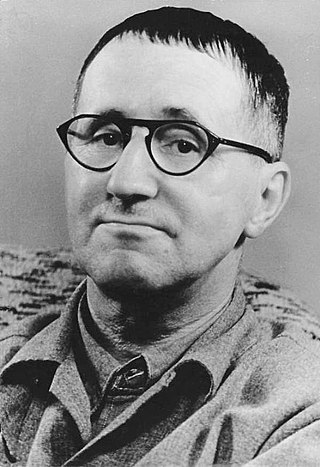
Eugen Berthold Friedrich Brecht, known professionally as Bertolt Brecht, was a German theatre practitioner, playwright, and poet. Coming of age during the Weimar Republic, he had his first successes as a playwright in Munich and moved to Berlin in 1924, where he wrote The Threepenny Opera with Kurt Weill and began a life-long collaboration with the composer Hanns Eisler. Immersed in Marxist thought during this period, he wrote didactic Lehrstücke and became a leading theoretician of epic theatre and the Verfremdungseffekt.
